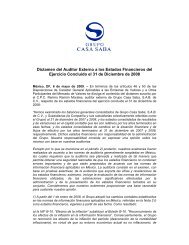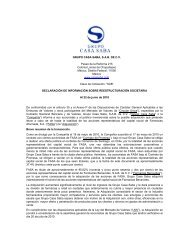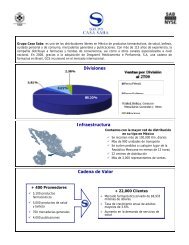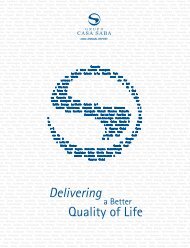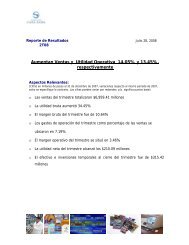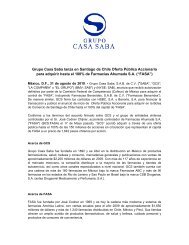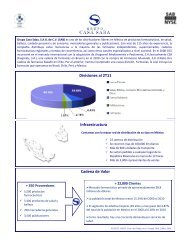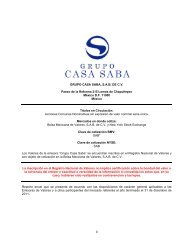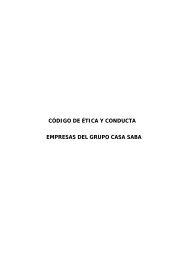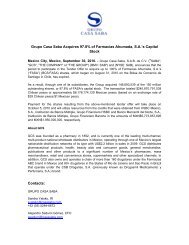FORM 20-F Grupo Casa Saba, S.A.B. de C.V.
FORM 20-F Grupo Casa Saba, S.A.B. de C.V.
FORM 20-F Grupo Casa Saba, S.A.B. de C.V.
Create successful ePaper yourself
Turn your PDF publications into a flip-book with our unique Google optimized e-Paper software.
Table of Contents<br />
The subsidiary Transportes Marproa is authorized to pay the higher of income tax or IETU separately from the Group un<strong>de</strong>r a tax regime known as the “administrative facilities”. This<br />
regime grants benefits regarding ascertainment of disbursements ma<strong>de</strong>, as well as other relative to credit “consumption taxes”.<br />
In conformity with the Mexican Income Tax Law, subsidiaries residing abroad do not consolidate for tax purposes. In addition, Mexican entities that are incorporated into the Group<br />
subsequent to the date on which the approval of tax consolidation goes into effect will do so as of the fiscal year subsequent to that in which ownership is acquired of more than 50<br />
percent of the shares.<br />
iv) In <strong>20</strong>05, the Company and its Mexican subsidiaries chose to <strong>de</strong>duct the cost of sales of the “base inventory” <strong>de</strong>termined at December 31, <strong>20</strong>04 for tax purposes. Therefore,<br />
those entities <strong>de</strong>termined the “cumulative inventory” value which is treated as taxable income. At December 31, <strong>20</strong>04, cumulative inventory amounted to Ps. 3,184,264. Its accumulation<br />
is annual, effective <strong>20</strong>05 through fiscal year <strong>20</strong>12. At December 31, <strong>20</strong>11 and <strong>20</strong>10, the cumulative inventory amount ad<strong>de</strong>d to the taxable income amounted to Ps. 851,086 and Ps.285,274,<br />
respectively.<br />
v) Income tax due is <strong>de</strong>termined by taking into account the <strong>de</strong>preciation on the restated fixed assets value, annual inflationary adjustment on monetary items, benefit of tax loss<br />
carryforwards, and the cumulative inventory effect of the year.<br />
vi) In <strong>20</strong>10 and <strong>20</strong>09, the Government of Brazil approved certain tax amnesty that allows for: (i) paying <strong>de</strong>bts on taxes on earnings and excise taxes in less strict conditions than<br />
those that normally apply; and (ii) offsetting tax loss carryforwards against taxes on earnings <strong>de</strong>bts and excise taxes. During the year en<strong>de</strong>d December 31, <strong>20</strong>11 and <strong>20</strong>10, the Company<br />
did not apply the tax amnesty program.<br />
b) Corporate Flat Tax Law (IETU-Spanish acronym)<br />
The annual IETU tax rate for <strong>20</strong>11 and <strong>20</strong>10 is 17.5 percent, whereas the tax rate is 17 percent for <strong>20</strong>09.<br />
The IETU Law does not recognize a regime for tax consolidation purposes. Accordingly, the Company and its Mexican subsidiaries should pay IETU individually. In terms of the<br />
Income Tax Law, each controlled entity may consi<strong>de</strong>r the amount of income tax that has been <strong>de</strong>livered to the Holding Company as its own income tax, which may be credited against<br />
IETU. At December 31, <strong>20</strong>11 and <strong>20</strong>10 and <strong>20</strong>09 some controlled entities generated IETU higher than income tax, therefore IETU was the annual tax due. In those years, annual IETU<br />
paid by the entities amounted to Ps.9,037 and Ps. 13,517, Ps. 19,826, respectively, which is inclu<strong>de</strong>d in income in “Provisions for income tax”. Payment of that tax is consi<strong>de</strong>red final.<br />
While IETU co-exists with income tax, entities will pay IETU if it is greater than income tax of the same period. IETU of the period is reduced by the amount of income tax paid in the<br />
same period due to taxable income and by the income tax paid on divi<strong>de</strong>nds distributed. If IETU is lower than income tax, entities are not subject to IETU. Moreover, if <strong>de</strong>ductions for<br />
IETU purposes exceed their taxable income, entities are not subject to IETU.<br />
At December 31, <strong>20</strong>11, <strong>20</strong>10 and <strong>20</strong>09, the Company and its Mexican subsidiaries <strong>de</strong>termined the tax credits permitted for the IETU Law. The amount of those tax credits does not exceed<br />
certain percentages, and their offset cannot exceed ten years as of fiscal year <strong>20</strong>08.<br />
F-46



